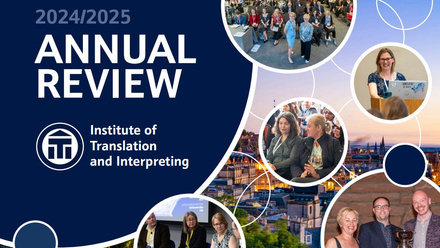An opportunity to influence Government
We stand at a critical juncture when it comes to the delivery of interpreting services in the courts. ITI's CEO reflects on giving evidence to the House of Lords Public Services Committee inquiry.
On 6 November 2024, ITI CEO Sara Robertson was invited to give evidence to the House of Lords Public Services Committee inquiry into the state of interpreting and translation in the courts alongside Mike Orlov (NRPSI) and John Worne (CIOL).
With a new framework for the provision of translation and interpreting services currently out to tender, the inquiry offers the ideal opportunity to highlight the systemic problems that have dogged the provision of interpreting services in the courts over the last ten years and to seek a better solution. The key question that I posed in the evidence session was whether the Ministry of Justice had truly learned from past challenges and built effective solutions into the new framework. It seems that the Committee would also like to know the answer to this question; in a letter sent to the Rt Hon Shabana Mahmood KC MP, Secretary of State for Justice, on 2 December Baroness Morris of Yardley, Chair of the House of Lords Public Services Committee, called for the Government to pause the re-tendering process until it has set out how a range of issues including remuneration and quality assurance will be addressed.
It is clear that we stand at a critical juncture with regard to the delivery of interpreting services in the courts. The probing questions from the Committee members revealed that they also recognise there are fundamental challenges that, if left unaddressed, threaten the ability of people who do not speak English as their first language to participate fully and equally in our legal system.
At the heart of the matter lies a profound disconnect between the professional nature of public service interpreting and how it is valued and supported within our justice system. The current commercial framework is dominated by a single large-scale supplier calling on a pool of freelance interpreters, creating an unsustainable dynamic. The power imbalance and the lack of meaningful dialogue and support between the supplier and the freelance interpreters has led to a system where there appears to be little incentive for the supplier to seek effective solutions to known problems.
What steps can be taken to address the problems?
ITI, CIOL and NRPSI are united in our call to make the DPSI (Diploma in Public Service Interpreting) Level 6 qualification mandatory for court interpreting. This well-respected qualification ensures that interpreters possess the comprehensive skills needed to handle complex legal terminology, understand court procedures, and maintain the highest standards of accuracy when working in court settings. Qualifications should also be backed up by a commitment to professionalism. Interpreters who are members of one of the professional bodies commit to abiding by codes of conduct, which means they can demonstrate the kind of ethical practice and commitment to quality that our justice system requires. Achieving this baseline of professionalism is essential for ensuring equal access to justice and maintaining the integrity of our legal proceedings.
However, we recognise that achieving this ambition will require substantial investment, as steps will need to be taken to create and maintain a robust pipeline of qualified interpreters. There is little support for training and professional development within the current system – a considerable failing. The Ministry of Justice therefore needs to invest in training schemes, providing clear career pathways for aspiring court interpreters, and creating mechanisms that encourage and enable people to achieve their Level 6 DPSI qualification. The interpreters themselves cannot be expected to fund this training given that they are not adequately remunerated, so the responsibility has to fall elsewhere. Without this investment in the future of the profession, there is a risk that there will be insufficient numbers of appropriately qualified interpreters to support the courts in the longer term.
Remuneration and working conditions
During the evidence session we returned to the topic of fees and working conditions repeatedly, as the precarious nature of freelance interpreting work cannot be ignored. I pointed out that, unlike employed staff, court interpreters lack basic provisions such as workplace pensions, benefits, holiday pay, sick pay, and training. There is also little in the way of health and safety measures – a serious concern when it comes to mental health and wellbeing. Interpreters are often poorly briefed, have to work in challenging situations in unfamiliar buildings, and receive little support when dealing with upsetting cases. The combination of the high cognitive load of solo interpreting for lengthy periods and the potential to suffer vicarious trauma is not sufficiently well recognised by non-linguists. So, while poor remuneration is a major concern and one reason why qualified interpreters are leaving the profession, the need to provide sustainable working conditions that recognise the professional nature of the role is also important.
Generative AI and court interpreting
The role of technology in court interpreting sparked a lively debate during the evidence session. When Lord Willis expressed disappointment at what he saw as resistance to new technology, pointing to his experience of having access to 270 different languages through an earpiece, I was obliged to explain why court interpreting presents unique challenges for AI systems. I noted that computer systems excel at pattern recognition – making them valuable tools in medical analysis scenarios, for instance – but language is far more complex than simple pattern matching. Generative AI systems are essentially statistical engines that neither “listen” nor “understand”. There have been impressive advances with regard to using machine translation for high resource languages, but the AI-based systems currently available would struggle with the nuanced reality of courtroom communication. Challenges include speakers switching between dialects, using slang or even Multicultural London English (MLE) for example, and being able to pick up meaning conveyed through body language or other contextual clues.
While there’s certainly a role for assistive technology in supporting interpreters’ daily work, we must be realistic about the current limitations of AI in high-stakes court settings where accuracy and consistency are paramount.
Recommendations
Resolving the current challenges is not straightforward and will require a fundamental shift in how we support public service interpreting. We need to build a collaborative system and stronger communication channels between all parties involved, as well as better recognition of interpreters' skills, experience and professionalism. We also need to recognise that maintaining high standards through continuing professional development will require continuing investment.
And while our primary interest is to support the highly professional interpreters in our membership we also care deeply about the bigger picture and ensuring that our justice system can effectively serve all members of our society, regardless of the languages they speak. The current framework, with its structural imbalance, low freelance fees, poor working conditions, and lack of support for professional development, risks driving talented and dedicated public service interpreters away from the profession entirely. This would only exacerbate the existing gaps in the provision of a vital support service.
It is therefore encouraging to note that our concerns are shared by the Public Services Committee. We sincerely hope that Baroness Morris’s letter to the Secretary of State will persuade the Ministry of Justice that further work is needed to ensure the framework for providing translation and interpreting services in the court is fit for purpose. The stakes are high – this isn’t just about efficient and effective service delivery; it’s about ensuring equal access to justice for all.






